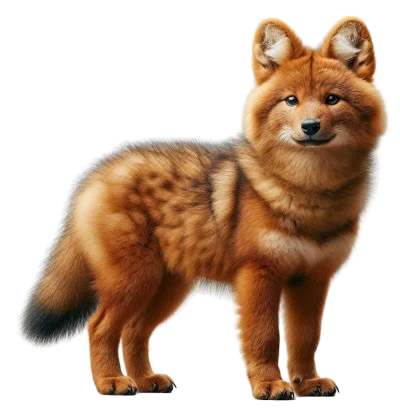
The Dhole (Cuon alpinus) is a wild canid native to Asia. Known for its complex social behavior, pack hunting skills, and adaptability to various environments, the Dhole is primarily found in tropical and subtropical forests of South and Southeast Asia.
The Dhole is a medium-sized canid, measuring about 46 to 66 cm at the shoulder and weighing between 10 and 20 kg. It has a short coat, usually reddish or orange, with brown and sometimes black shades. Its body is slender, and its tail is long and bushy. It has small, rounded ears and light brown eyes, giving it a bright appearance.
The Dhole (Cuon alpinus) belongs to the Canidae family.
The Dhole is closely related to the grey wolf and coyote, sharing many behavioral and biological characteristics. It is distinct due to its pack hunting strategies and highly social lifestyle.
The Dhole inhabits a variety of habitats, including tropical and subtropical forests, mountains, and wooded areas in South and Southeast Asia. While it prefers forested zones, it can also be found in savannas and open grasslands. Due to its mobility and adaptability, it can thrive in diverse environments, from plains to higher altitudes.
The Dhole is a highly social animal, living in well-organized packs ranging from 3 to 12 individuals. Unlike other canids, Dholes cooperate closely in hunting, showing great coordination. They communicate with one another through vocalizations and body behaviors. The pack's social structure is highly hierarchical, with clear roles for each member.
The Dhole is a carnivore and primarily hunts small to medium-sized mammals, such as deer, wild boar, and sometimes birds. Its pack hunting method allows it to capture larger prey than an individual could manage alone. It is also opportunistic and may feed on smaller animals when available.
The Dhole is classified as an endangered species by the IUCN. Its populations are threatened by habitat loss due to deforestation, human conflict, and illegal hunting. Habitat fragmentation and diseases transmitted by domestic dogs also pose significant threats to its survival.
The Dhole, also known as the Asiatic wild dog, belongs to the genus Cuon. Although the Dhole is unique in its genus, it shares genetic similarities with other members of the Canidae family, notably the Golden Jackal (Canis aureus) and the Gray Wolf (Canis lupus).
Observing a Dhole in its natural habitat is a rare and valuable experience. Here are some tips for a respectful and safe observation:
By following these tips, you can enjoy an enriching observation while contributing to the preservation of this endangered species.